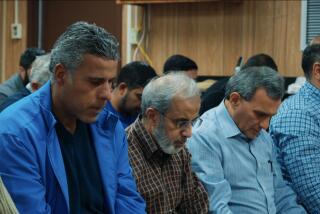So where are the Muslims on ‘CSI’?
- Share via
SUMAYA ABUBAKER doesn’t go to movies much anymore. Nor does she watch television. It’s too painful for her to see Muslims stereotyped as terrorists, fanatics and fools.
“You see a scary-looking, heavy-bearded man shouting ‘Allahu Akbar!’ and you know you are going to be disappointed again,” said Abubaker, whose parents emigrated from Yemen.
Still, Abubaker volunteered at the 15th annual Media Awards, sponsored by the Muslim Public Affairs Council. The event, held downtown last weekend, honored the makers of “Paradise Now” and “Syriana” as “voices of courage and conscience.” Coincidentally, the awards were handed out on the same day as the closing ceremonies of the Azusa Street Centennial celebration, which commemorated the 100th anniversary of the birth of Pentecostalism in what is today Little Tokyo. Spurned and derided by the mainstream media of its day, Pentecostalism has become the fastest-growing Christian movement in the world.
In Samuel Huntington’s 1993 essay, “The Clash of Civilizations?” the world’s 1.3 billion Muslims and 2.2 billion Christians are on a collision course. In truth, they face a common enemy -- the mainstream media. The controversy about a Danish cartoonist’s depictions of the prophet Muhammad starkly illustrated the problem. But the tension over who chooses and controls images in the media is roiling producers and consumers of news and entertainment.
Cultural stereotypes have long been an unfortunate media shortcut. Muslims may be the fanatics du jour, but Pentecostals once wore the label. Even before such movies as “Elmer Gantry” mocked the fervidly faithful, mainstream newspapers disparaged the behavior of true believers.
“Breathing strange utterances and mouthing a creed which it would seem no sane mortal could understand, the newest religious sect has started in Los Angeles,” is how a 1906 Los Angeles Times article described a Pentecostal service. “Colored people and a sprinkling of whites compose the congregation, and night is made hideous in the neighborhood by the howling of the worshipers.”
Such biases are no less evident in today’s newspapers and entertainment media. I can’t recall a Muslim doctor or lawyer in any recent movies or television shows. And although I haven’t seen many Hindus, Buddhists or Pentecostals either, those I have seen are not depicted, as Muslims often are, as terrorists.
But it’s not just what “we” do to “them.” They do the same thing to us.
Friends living in Egypt despair of the antiZionism there that makes it necessary to conceal their Jewish identity. Yet even as they hope to someday speak openly with Muslim friends, they see how they’ve been blinded by their own preconceptions of Arabs and Islam.
Abubaker, whose world was similarly defined by people like herself, says working in the business world has exposed her to others’ humanity. “I never talked to so many Jews before -- not about religion or politics but about families, kids and interesting experiences we’ve had,” she said. “It was a real awakening because there’s a human side to people that you neglect when it’s just about politics.”
Abubaker agreed with leaders of the Muslim Public Affairs Council who praised “Syriana” and “Paradise Now” for bringing a “human side” to Muslim characters. In “Paradise Now,” two young Palestinians are recruited as suicide bombers, yet during the course of a mission they reconsider their choices. The two are depicted as innocents, but the recruiter is unscrupulous -- underscoring the film’s message that suicide bombers are made, not born.
ACCEPTING THE award for the film, Mark Gill, until recently president of Warner Independent Pictures, commended the filmmakers for providing “a stunning look into a world we didn’t know much about.”
Abubaker agreed. She liked the movie a lot. But after leaving the theater, she and a friend had a disturbing encounter.
The two women, one wearing a hijab (a head scarf), heard two young men arguing about the film. Seeing the Muslim women, they walked over to complain that “their people” wanted to live in the past.
“I was furious,” she recalled. “Here’s a great movie that brings to light the complexity of the situation, and [one of the men] boils it down to Muslims are backward and uncivilized.”
Obviously, we need more movies and television shows that reflect the complexity of the situation. Maybe a Muslim MD or lawyer, but please, no desperate housewife in a hijab.
More to Read
Sign up for Essential California
The most important California stories and recommendations in your inbox every morning.
You may occasionally receive promotional content from the Los Angeles Times.










